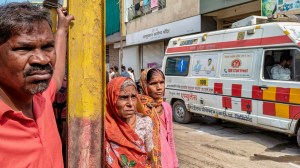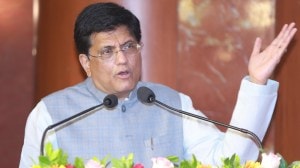Capital crime
It is truly mind-boggling that an alleged criminal like Romesh Sharma could operate with impunity all these years right under the nose of...

It is truly mind-boggling that an alleged criminal like Romesh Sharma could operate with impunity all these years right under the nose of the Central government. If the newspaper reports that have appeared so far are anything to go by, he was a law unto himself. A petty businessman, he has over a short period built up assets worth hundreds of crores of rupees in the Capital and elsewhere through extortion and forced occupation of property. Not only that, he had the money and muscle to think even in terms of floating a political party with a view to capturing power. Politics was not an altogether new field for him as he had, unsuccessfully albeit, contested the last elections in Uttar Pradesh. Throughout he maintained excellent contacts with politicians in power, who were permanent fixtures at the gala parties he frequently threw at his palatial bungalows and sprawling farmhouses. He had his contacts with dreaded gangster Dawood Ibrahim, whose name he used to strike terror in the hearts of his victims. Inreturn, he provided cover to Dawood8217;s kin at a time when police across the country were looking for them in the wake of the bomb blasts in Mumbai. It is unbelievable that the Delhi police had no clue to the goings-on in Sharma8217;s mafiadom until, the other day, he fell into their net by chance.
To give the devil his due, Sharma is not wide of the mark when he says his political patrons have ditched him when he most needed their support. Perhaps it is the fear of media that prevents his benefactors from coming to his rescue. Possibly, they will step in at a more opportune time. After all, Sharma could not have operated so long without the support of influential people in government and the police. Think of it. Why was it that not one of his victims ventured to file police complaints against him? They either realised the futility of such a venture or feared that Sharma8217;s vendetta would have been more severe than the loss they had already suffered. In neither case does this redound to the credit of the law andorder authorities. Now that Sharma is in police custody, it may not be difficult to thoroughly verify his antecedents and establish the links he had with other criminals. Equally important is to break the nexus he had with those in power. But this is easier said than done. The case for which the police have detained him will at best result in a few years8217; jail term for Sharma while his accomplices will go scot free.
It is such an eventuality that has to be prevented. In the Jain hawala case, the charge against the hawala operators was that they had financed both terrorists in the Kashmir Valley and leaders of mainstream political parties. In Sharma8217;s case too, his beneficiaries included powerful politicians and gangsters. In the hawala case, the ineptitude of the investigators helped the politicians to escape, even though some of them admitted to having received money, as mentioned in the Jain diaries. If such a fate is not to befall this case, the path these investigations take should lead to those verypoliticians and officials who helped Sharma build his reputation as a ruthless operator.
- 01
- 02
- 03
- 04
- 05































